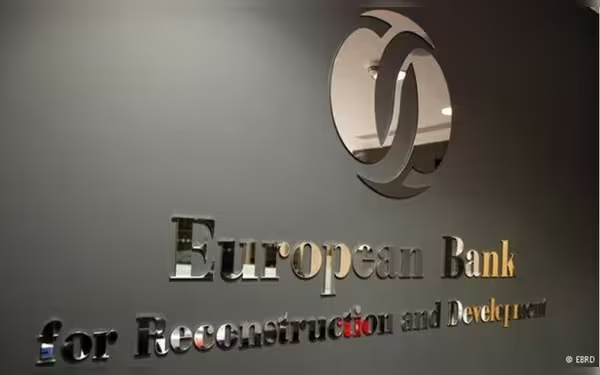Saturday, November 16, 2024 05:51 PM
EBRD President Urges Increased Climate Investments Amid Global Challenges
- EBRD commits $7.5 billion to climate finance in 2023.
- MDBs play crucial role in financing climate resilience.
- Global trade tensions threaten emerging market growth.
 Image Credits: brecorder
Image Credits: brecorderEBRD President Odile Renaud-Basso emphasizes urgent climate investments amid global economic challenges.
In recent years, the urgency to address climate change has become a pressing global concern. As nations grapple with the implications of environmental degradation, multilateral development banks (MDBs) are stepping up their efforts to invest in sustainable solutions. The European Bank for Reconstruction and Development (EBRD) is at the forefront of this movement, emphasizing the need for increased financial commitments to combat climate change, especially in light of shifting political landscapes.
Odile Renaud-Basso, the president of the EBRD, highlighted the bank's commitment to enhancing investments in the green sector. She stated, "MDBs are really stepping up the number and the action in their level of investment in the green sector." This statement comes amid concerns regarding the United States' climate policy under the Trump administration, which has been characterized by skepticism towards climate change initiatives.
As the world prepares for the UN Climate Conference COP29 in Azerbaijan, Renaud-Basso's remarks underscore the critical role that MDBs play in financing climate resilience, particularly for poorer nations. The EBRD has pledged billions of dollars to assist these countries in managing the impacts of climate change. In 2023 alone, the EBRD committed $7.5 billion towards climate finance, successfully attracting an impressive $26.7 billion in private sector investments.
The International Energy Agency has projected that global investments in clean energy and infrastructure will reach a staggering $2 trillion this year. This figure reflects a growing recognition of the need for sustainable energy solutions. The EBRD has also been instrumental in helping Azerbaijan transition to greener energy sources, approving two solar projects that are expected to generate a combined total of 750 megawatts of energy, with an investment of $666 million.
However, the global economic landscape is fraught with challenges. President Trump’s proposed tariffs on goods from various countries, including China and the EU, have raised concerns about a potential trade war. Renaud-Basso warned that such tensions could adversely affect growth in emerging markets, stating, "An increase of tensions, a ... trade war with measures and countermeasures globally, will never be good for the world, for the growth of the economy and for our region, which is dependent on the dynamic of growth in the EU or in China." This highlights the interconnectedness of global economies and the potential ripple effects of protectionist policies.
In addition to these economic challenges, the EBRD has revised its regional growth forecasts downward for the second consecutive time. This reflects the ongoing uncertainties in the global market. Renaud-Basso also addressed Turkey's recent shift towards more orthodox monetary and fiscal policies, emphasizing the importance of maintaining a steady course in economic reforms. She remarked, "What is in my view very important is the steadiness and the fact that they keep on track." This statement reinforces the idea that consistency in policy is crucial for economic stability.
As multilateral development banks like the EBRD intensify their focus on climate change investments, the global community must remain vigilant about the economic and political factors that could hinder progress. The commitment to sustainable development is not just a financial obligation; it is a moral imperative that affects the future of our planet. By fostering international cooperation and maintaining a steady course in policy-making, we can hope to navigate the challenges ahead and work towards a more sustainable and equitable world.













